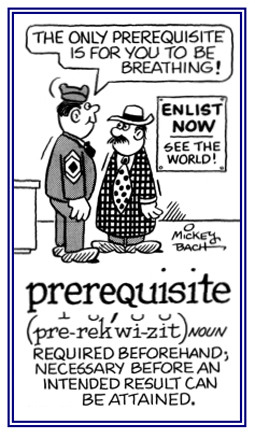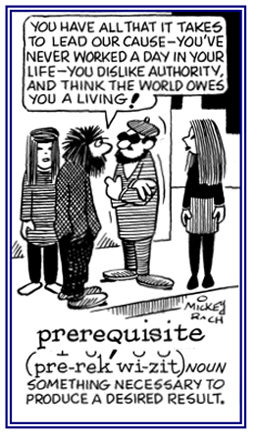pre-, prae-
(Latin: before [both in time and place])
The prefix prae- can actually be substituted for pre- because both of them are different spellings for the same prefix meaning "before".
2. An action or condition in which one thing must be done in order for something else to happen: The university specified that the introductory course was a prerequisite for taking the advanced level course in the subject that Jill wanted to major in.
The bank tells its customers that maintaining a good credit rating is a prerequisite for applying for a loan.


Go to this Word A Day Revisited Index
so you can see more of Mickey Bach's cartoons.
2. A privilege or right that allows a particular person or group to give orders or to make decisions and judgments: Well, if Tom would rather sell his football tickets instead of using them, that's his prerogative.
3. The right conferred by a natural advantage that places someone in a position of superiority: Getting a seat on a full bus is one of the prerogatives of being a senior citizen.
4. The power or right of a monarch or government to do something or to be exempt from something: Parking in normally restrictive areas in the city is a prerogative of Mayor Dawson's chauffeur.
5. Etymology: from Old French prerogative, Medieval Latin (about 700-1500) prerogativa, "special right"; from Latin prærogativa, "prerogative, previous choice or election"; originally (with tribus, centuria), "unit of 100 voters who by lot voted first in the Roman comita"; feminine of prærogativus, "chosen to vote first"; from prærogere, "to ask before others"; from præ-, "before" + rogare, "to ask".

Go to this Word A Day Revisited Index
so you can see more of Mickey Bach's cartoons.
2. A feeling that a particular thing, often something unpleasant, is about to happen; ill-omen: Ted wasn't sure, but he had a strong presage that he wasn't going to live much longer!
2. To predict or to foretell: There were certain events in Lynn's past that presaged her in becoming a teacher.
Symptoms of presbycusis are gradual hearing loss and tinnitus.
The normal process of growing older produces changes in the cochlea and the cochlear nerves and, in other words, damage in the inner ear, and results in permanent sensorineural hearing loss.
Presbycusis most often occurs in both ears and, because the loss of hearing is so gradual, people with presbycusis may not realize that their hearing is diminishing.
Presbycusis is common, affecting a third of the people between 65 and 75 years and up to a half of the people 75 and over.
The only treatment for presbycusis is the wearing of hearing aids which can be worn in the ears or behind the ears.
Other visual communicative techniques, such as lipreading or watching facial expressions, are also helpful in coping with hearing loss.
2. A disorder in the elderly characterized by altered spontaneous movement of the alimentary tract: Mr. Hathaway, affected with presbyesophagus, had to eat very slowly because swallowing his food was very difficult for him.
Presbyophrenic informal conversation normally shows poorness, dullness, immaturity, and simpleness of content. Because ethical conduct is maintained for a comparatively long time, the patient is capable of blending into small social groups, especially because his or her feelings or emotions tend towards happiness and good-naturedness.
The reasons for this loss of the power of accommodation are not yet fully known. It is conventionally said to be a result of the lenses of the eyes becoming less elastic with time.
Presbyopia is associated with aging, however it happens with everyone. The first sign is often the necessity to hold reading material farther away in order to be able to focus on the contents.
The term presbyopia is said to come from the Greek for "elderly vision".
Related before-word units: ante-; antero-; anti-; pro-.
Related "time" units: aevum, evum; archaeo-, archeo-; Calendars; chrono-; horo-; Quotes: Time; tempo-.


